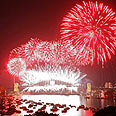
69% in favor of New Year's Eve celebrations in Israel
Majority of public sees no problem with celebrating civil new year, but is opposed to government financing of it. And, is it acceptable for rabbinical authorities to deny kosher certificates to establishments that celebrate civil new year? Find out in Ynet-Yesodot poll
More than two-third of the public in Israel sees no problem whatsoever in events celebrating the civil new year, according to a joint Ynet-Yesodot survey conducted just before the ushering in of 2010. However, a majority of the Israeli public is opposed to official government funding of New Year's celebrations. Nor would they support, however, denying kosher certification from establishments that host such festivities.
The survey was conducted by Panels on 508 respondents in a representative sample of the adult Jewish population in Israel. The maximum sampling error is 4.4%±.
The first question asked of the respondents was "Do you or any of your children plan on celebrating New Year's Eve?" The results showed that 69% of the respondents answered that they view New Year's celebrations in a positive light. Of these, 48% said they do not plan on participating in the festivities even though they do not have a problem with them, while 21% plan on taking part in New Year's celebrations. On the other hand, 31% of the respondents said "No way! This is a Christian holiday, not a Jewish holiday.
Analyzing the responses according to religious affiliation shows that 91% of the religious and 89% of the haredim are opposed to such celebrations, while 54% of traditionalists and 59% of seculars do not see them as problematic. The number of those ushering in the civil new year with parties and celebrations was highest among seculars, with more than a quarter (28%) saying they would mark the start of 2010 in some way.
Should cities and public bodies in the Jewish State of Israel help organize New Year's parties in cities with a Jewish majority? Fifty-five percent responded in the negative, and claimed that government authorities should only mark Jewish festivals, whereas 37% responded that "if a majority of the public is interested in celebrations, they should be funded." Another 8% responded "absolutely not."
Breaking down the results by religious affiliation shows that the secular public (48%) is the only group that expects the Jewish regime to fund celebrations of the Christian holiday when most of the public is interested in partaking of them. Religious (87%), haredim (82%), and traditionalists (65%) all said responded with a resounding no.
In the last section of the survey, respondents were asked if local rabbinical authorities should revoke the kosher certifications of establishments that host New Year's parties. Some 61% responded that they are vehemently opposed to such a move, saying: "They should take care of the kashrut of the food and not get involved in things unrelated to this." On the other hand 23% believe that "it's entirely okay because the role of the rabbinate is to ensure that the Jewish spirit is being maintained." The remaining 16% claimed that such a move would be detrimental because it would cause many businesses to forego their kosher certification.
By religious affiliation, haredim (78%) and religious (63%) said they support revoking kosher certification in such a case, while seculars (78%) and traditionalists (54%) said they are opposed to such a move.
Shoshi Becker, educational director of Yesodot Center for Torah and Democracy said, "A notable portion of the public is not opposed to celebrating the New Year, yet, on the other hand, a majority of the public would like to maintain a Jewish public atmosphere in the State of Israel. A majority perceives the state as Jewish and democratic. From here, there is no place for local authorities or public bodies to help fund New Year's parties."
According to her, "The religious public is not pluralistic and is interested in providing space and a broad position to the rabbinate in order to allow it to maintain the Jewish spirit in the country, not just kashrut. The responses of the seculars and the traditionalists, who are resolutely opposed to the intervention of the rabbinate in New Year's affairs, yet on the other hand, respect the rabbinate on issues of kashrut, must be viewed by the haredim and religious as their willingness to maintain the Jewish character of the State of Israel."










